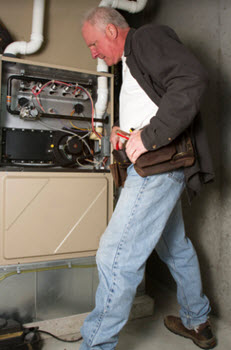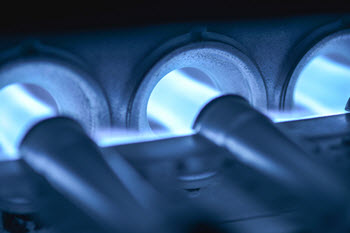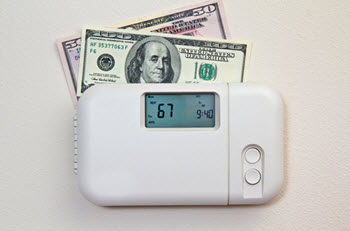Why Bigger Isn’t Always Better When It Comes To Your Home Heating System
 When you are selecting a furnace, bigger does not always mean better. Many homeowners mistakenly believe that if they purchase a large heating system, it will reduce the heating costs for their home.
When you are selecting a furnace, bigger does not always mean better. Many homeowners mistakenly believe that if they purchase a large heating system, it will reduce the heating costs for their home.
However, having an oversized heater can negatively impact the entire HVAC system.
It can cause the HVAC system to degrade and lead to numerous HVAC problems before the system completely breaks down. You also will be unable to produce a comfortable and healthy indoor environment with an oversized heating system.
Homeowners who have oversized heating systems will often experience high operational costs and poor indoor air quality. Also, since the HVAC system is too large, it creates more repairs that would not be caused by an appropriately sized system.
Purchasing an oversized system overall is an expensive mistake that gets made way too often. Therefore, it is important to hire a reputable HVAC company during an HVAC installation. They can find the best unit size for your home to ensure you receive a high level of comfort and that your system performs efficiently.
Furnace Replacement Service Discusses The Issues That Come With A Large Heating System
Contents
- 1 Furnace Replacement Service Discusses The Issues That Come With A Large Heating System
- 1.1 Heater Installation: Ductwork And Fuel
- 1.2 Does Your Humidity Level Fluctuate?
- 1.3 Short Cycling Is A Very Common Problem With Oversized Furnaces
- 1.4 Temperature Imbalances Inside Of Your House: Cold And Hot Spots
- 1.5 Higher Than Normal HVAC Operating Costs
- 1.6 Is Your Heating System Overly Noisy?
- 1.7 Heating System With Unrealistic Efficiency Ratings
- 1.8 Conclusion
Fortunately, some signs will tell you whether or not your furnace is the proper size. When you know what to look for, it can help you determine what action you need to take. Those signs include the following:
Heater Installation: Ductwork And Fuel
If you buy an oversized furnace, then most likely the installation will be complicated. For example, you have to hire a professional to move or adjust your fuel connections to accommodate your heater. Also, if the furnace is not compatible with your current ductwork, you might need to replace or modify the ductwork.
Does Your Humidity Level Fluctuate?
To create a comfortable indoor environment, the humidity levels inside your house need to be consistent throughout your home. Unfortunately, if the furnace in your house is too large, that will most likely cause humidity levels inside of your house to fluctuate constantly, and that can lead to humidity problems. It will increase the chances of mold growth. Humidity problems also create an indoor environment that is less comfortable and causes respiratory issues, like asthma and nasal congestion. This issue is due to allergens being present in water vapor.
Short Cycling Is A Very Common Problem With Oversized Furnaces
 The most common sign that you have an oversized heater is short cycling. If your furnace is too large, it will heat your house too fast. However, since the rest of the HVAC system has not been designed to manage the amount of heat that an oversized furnace generates, the thermostat on your unit will shut the furnace off prematurely to keep it from overheating. This can result in short cycling. Short cycling will, unfortunately, increase the amount of wear and tear on the furnace, which causes it to break down often. That will result in it having a shorter lifespan. Your heating costs will also increase significantly with short cycling.
The most common sign that you have an oversized heater is short cycling. If your furnace is too large, it will heat your house too fast. However, since the rest of the HVAC system has not been designed to manage the amount of heat that an oversized furnace generates, the thermostat on your unit will shut the furnace off prematurely to keep it from overheating. This can result in short cycling. Short cycling will, unfortunately, increase the amount of wear and tear on the furnace, which causes it to break down often. That will result in it having a shorter lifespan. Your heating costs will also increase significantly with short cycling.
Temperature Imbalances Inside Of Your House: Cold And Hot Spots
If a furnace is too large, it will cause your home to have temperature imbalances throughout it. More specifically, those areas that are nearest to the heater are going to be warmer than the places that are farther away from the heater. At that point, it is imperative to make a note of the fact that temperature imbalance may cause the furnace to overwork and malfunction. So if you notice any temperature imbalances inside of your house, then most likely you have an oversized furnace.
Higher Than Normal HVAC Operating Costs
 As previously mentioned, one of the significant signs that you have an oversized furnace is short cycling. Short cycling also causes the furnace to use up more fuel and energy, which results in higher heating bills. So if your heater is too large, then you should have an experienced HVAC technician replace it with a system that is better suited for your home.
As previously mentioned, one of the significant signs that you have an oversized furnace is short cycling. Short cycling also causes the furnace to use up more fuel and energy, which results in higher heating bills. So if your heater is too large, then you should have an experienced HVAC technician replace it with a system that is better suited for your home.
Is Your Heating System Overly Noisy?
If the furnace is too large, most likely it will be very loud since the current duct system will not be able to support it fully. Although a noisy heater may be a sign of problems other than the HVAC system, it definitely can be a real nuisance.
Heating System With Unrealistic Efficiency Ratings
Generally speaking, high-performance furnaces have a high BTU capacity and AFUE ratings. However, that isn’t always true when it comes to high-performance oversized heaters. So if you have a high-performance furnace that is too large, it won’t ever attain its highest BTU and AFUE capacity ratings, and that means you won’t ever enjoy the energy efficiency benefits that it offers.
Conclusion
Having a furnace that is too large comes with a slew of issues. To avoid these kinds of problems, work with an HVAC professional so that you can determine the right size furnace for your home. In particular, a qualified HVAC contractor can perform a load calculation on the house, which allows you to select the proper size furnace.
An HVAC company that you can trust to service the heating system correctly is McAllister Energy. We have NATE certified technicians on staff who can do an excellent job for you.
Here at McAllister Energy, we provide first-rate HVAC replacements, tune-ups, installations, and repairs. Our experts have all of the necessary expertise and skills to provide you with affordable and practical services. Call us today. We offer in-home free estimates and will be very happy to serve you.
Contact McAllister Energy today, and we will be happy to assist you. Contact us now at (856) 665-4545 to find out more!
